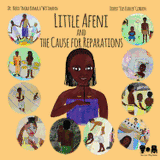-31%
From School Library Journal
Gr 2–5—An illustrated work on the 1619 Project for young readers, this adaptation begins with a school assignment. A young Black girl is told by her teacher to trace her roots, but she is not aware of her origins beyond a few generations. When she recounts this at home her grandmother responds by gathering the family members together to tell their story. Thus begins a visual journey back centuries to the Kingdom of Ndongo in West Central Africa, the birthplace of their ancestors, "They had a home, a place, a land, a beginning." The authors' storytelling is utterly hypnotic, revealing a vibrant community that once spoke their own language and flourished in building and trade. "They spoke Kimbundu, had their own words, for joy, for grow, for home." The opening pages radiate warmth, elation, and celebration through the artwork, which moves and dances along with the people. Sweeping brush strokes and earthy tones are splashed with a bright yellow. With the turn of the page, the triumphant atmosphere vanishes as terror envelops the community, artfully represented in dark mournful blues and deep fiery reds. Entire families are kidnapped and sent by white people to a new country sailing on the White Lion: "We were born on the water. We come from the people who refused to die." The horror of the voyage and the subsequent life in Virginia where these families became slaves is deeply felt through the evocative images. Chaotic sweeps of color are in balance with the smooth lines on the faces of the people who endured, resisted, remembered, and survived. Smith also adds African scarification pattern motifs throughout that create a striking textured effect. The narrative is told in a flowing verse that informs yet also stirs emotion. The lyrical text does not leave readers in despair but confident in the knowledge of the legacy so many Black people forged, "Never forget you come from a people of great strength," Grandma says, "Be proud of our story, your story." VERDICT A stunning work, providing a glimpse into the history of the Black experience before and after the slave trade; the poetic language and breathtaking artwork will have a lasting effect on readers.—Claire Moore, Manhattan Beach Lib., CA




